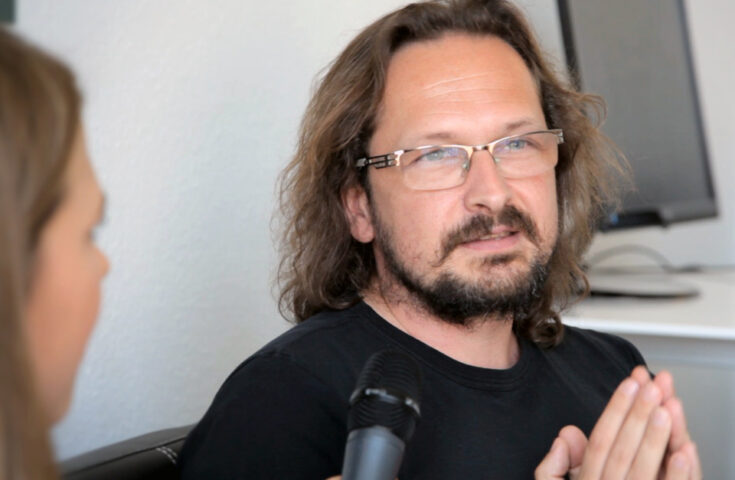In the past, Dusan Stojanovic, Director and Founder of True Global Ventures (TGV), has guided the ScandAsia readers within the world of financial technology (fintech). The Singapore-based Swede now returns, along with co-author and General Partner Beatrice Lion, to share insights into AI and TGV’s 2023 megatrends analysis. They also update on the development during the year of the megatrends, which have seen even faster progress than anticipated. Dusan also comments on some aspects in relation to the Nordics context.

TGV’s latest technology megatrends were published in early January 2023 (following on those in 2018). For the analysis conducted, it gathers insights on what is going on in the 15 countries it covers worldwide, to come up with “sharp megatrends that stick out”. Investment-wise, their objective is not to get all of them right but to be bold and confidently take some risks on those megatrends. As a result of hitting one of the previous megatrends, the TGV 4 Plus Fund had become one of the top performing Venture Capital funds globally in about 24 months.
“After less than a year we are seeing that four megatrends are happening much faster than we expected,” says Dusan. “Our Megatrends are for 4-5 years in the medium term range, but AI can be said to have evolved more rapidly than expected, as adoption is happening much faster. Results and profits, though, are still within the expected time range for such companies to grow.”
Beatrice recognises that AI has been on everybody’s lips during 2023 – for the following reasons: “A) Technology: OpenAI and other LLM [Large Language Model] tool sets allow for acceleration of developing applied AI tools, with generative AI development and not just predictive AI. B) Education: The understanding of what AI can do for productivity and effectiveness – for enterprise B2B clients – and debunking the fear of using AI. C) Accessibility: More options and lower price points as competition sprouts – which makes it more accessible for trial both on the enterprise and consumer side.”

As has been widely covered, artificial intelligence has entered a generational change, where new generative AI models are not only capable of carrying on sophisticated conversations with users; they also generate seemingly original content. Generative AI has also increased accuracy and productivity while lowering costs in various industries such as finance, entertainment, healthcare, manufacturing and transportation.
TGV has positioned itself to leverage the best growth-stage Generative AI investment opportunities during the current market conditions, targeting areas like Legal AI, Education AI, Revenue AI and Code-related AI, where the VC firms sees that Generative AI has material impact on productivity but also on new revenue streams.
“We’re comparing private and public markets: the Magnificent 7 is trading at very inflated valuations and they are not pure play AI companies. However, we see opportunities in single industry-focused AI companies who are still private at much lower multiples [calculated valuation ratio]. We are also still seeing opportunistic access of secondaries at deep discounts when investing in the private markets. Data from the leading private market secondaries marketplace (Forge Global) shows the median technology company trading on the platform is still trading at a 54% discount.”
Systems, such as ChatGPT, have the potential to transform entire industries. The success of ChatGPT and similar services has driven enormous user adoption, with strong productivity gains for companies, including SMEs. And Dusan agrees that to be an industry leader in five years, one needs a clear and compelling generative AI strategy today. He also recommends exploring Small Language Models and the use of it in niche areas/sectors where it can be more accurate – although not as broad-based in knowledge, since it is trained with a smaller base of knowledge than LLM.
“To be wary of, the technology development of LLM and application built on top of these LLMs can also wipe out complete business models within AI. New business models will come up in AI – for example in middleware [software that lies between an operating system and the applications running on it] for interoperability across different LLMs,” he informs.

Going deeper with Generative AI generates fundamental use cases for productivity gains, additional revenue streams, and even creates unfair competitive advantages for many organisations if they know how to harness them correctly, states TGV.
“This is about being able to generate insights that constitute an unfair competitive advantage. It’s like comparing companies who have proprietary information with companies who do not and only have public information,” Dusan elaborates.
“One such user case is a TGV portfolio company, a marketplace for secondaries in private market transactions (i.e. buying and selling of private market technology companies’ shares). They have data from these secondaries transactions in terms of price transacted in between fundraising rounds (especially given that companies are delaying their next financing rounds – average time between most recent and previous funding round for Mid- and Late-Stage companies on the Forge platform is more than 21 months), bid and ask (the order book of what investors are willing to buy and sell for), and the exercise or non-exercise of Right of First Refusals (ROFR) giving insights also whether the price transacted is above or below existing investors’ expectations. They can use such data to produce insights (Predictive AI – already possible now) on expectations of pricing for private market shares. For example they accurately predicted the price of the Palantir direct listing. They can then use such data to generate recommendations with such insights (though Generative AI accuracy is probably not high yet).”
TGV also works within the portfolio to leverage on Generative AI for more efficiency and effectiveness, where Beatrice, aside marketing, gives two examples.
“Revenue AI is used for any portfolio company with a sales team of more than five people, where the AI tool can based on the enterprise database (proprietary information) recommend more sales leads and prioritise for the sales team clients with the highest chance of closing a deal with, based on buying signals. Second is code-scanning AI – used for exploratory stages for portfolio companies who have more than 20 developers to pre-process their code or code that has been iterated on many times with different members of the team and then put together. The tool can process million of lines of code and determine: 1) Priority of which errors should be solved first 2) Recommend how to solve the code errors 3) With accuracy of a high significance.”

On the content front, what about translation, such as of fiction books, could it be replaced by AI? The VC investor believes so: “Although this is not an area we invest into yet, translation is a low hanging fruit and can already replace translation work with high accuracy. Translators would be expected to charge less since they would merely be proof reading or in the case of corporate documents notarising the translation. In the future, with LLM that are more proficient in a certain language base (e.g, G42 for Arabic, Ernie Baidu / Hunyuan Tencent LLMs tailoring to Chinese content), proofreading would not be necessary anymore.”
2023 also saw the power struggle within Open AI continue. “The intention with Open AI is to make sure humanity is not at risk at the expense of rapid AI development. Can that really work without a more decentralised and/or regulated AI industry? Right now, there are only a few players developing and launching AI models for the masses, around 15 in the U.S., 11 in China, 1-2 in other developed nations – limiting access to the mainstream. Our view is that the industry needs to have a more open playfield; that regulation is needed as soon as possible and that it is way more critical than regulating the Blockchain Industry. AI will have a way more critical impact on our future,” states TGV, and compares: “The Internet was not owned by anyone when it was started. It should be the top priority today to regulate AI development for any country, starting with the U.S., which we estimate is nine months ahead of China and even more ahead of the rest of the world.”
Dusan adds: “Our original five-year megatrend is that the decentralisation will also be needed in AI. By that we mean that there will be strategies for adopting a more decentralised approach, because people feel more comfortable – exactly as with Bitcoin. People will probably adhere more to something which actually doesn’t have a vested interest, which is the case in what’s happening in open AI.”

Concerning generative AI/AI he also expresses his concern from a Nordic perspective.
“In the old days we all wanted to have an airline that was state-owned. And I do believe every country needs an airline – either state- or privately owned, because it’s part of infrastructure. Otherwise: how do you do business and how do you travel? Then, every country also wanted to have their own telco, and we were pretty good at that. And what is alarming is that with generative AI and AI it’s the same: it’s in the national interest of every country to have this kind of infrastructure. The Wallenberg’s are doing something, but if you compare where the others are, where are we today in terms of this? It’s about really ensuring that we are at the top, having what’s needed in terms of infrastructure to build an even more modern society, because every single company is, or will be using, AI/generative AI, including productivity tools. I think that where things are today in the world concerning technologies you actually need to ensure you have access to the latest within AI!”
The second and third megatrends concern that ‘Centralisation is dead, while decentralisation is more than back!’, plus that consumer demand will accelerate the need for security, privacy and regulation – where Bitcoin is at the heart of the trends.
TGV: “We believed that Bitcoin would be one of the absolute strongest use cases for blockchain technology since it’s completely decentralised and there is nobody to make a legal claim against. In this respect with all other legal battles between regulators and the industry, Bitcoin is untouchable and will remain untouchable, so the limited downside risk is even clearer now than it was in the beginning of the year. At the same time traditional finance is taking over from pure players in terms of market share.”
Secondly, TGV is seeing institutional investors’ demand for exposure to Bitcoin will accelerate the need for regulation.
“With wrappers like Spot Bitcoin ETF [exchange-traded fund] getting regulatory clearance, institutional investors are going to get more comfortable investing into Spot Bitcoin ETFs with Bitcoin as the underlying asset (without worrying about having to deal with custody of Bitcoin and purchase and sale), and, therefore, Bitcoin demand is increasing as an alternative asset class,” says Dusan.

Spot bitcoin ETFs have direct ownership of Bitcoins, offering a regulated and accessible way for mainstream investors to invest in the digital currency.
“The big news is specifically with regards to the recent ruling against the [U.S.] Securities and Exchange Commission (SEC) linked to Bitcoin ETFs. SEC getting a slap on the wrist with the failed appeal against Grayscale’s Bitcoin ETF is a testimony to more clarity for certain alternative asset classes.”
“One could argue that we will only know the real demand once the Bitcoin ETFs are set up but on the other hand the question is whether not new money will go into these Bitcoin ETFs or if it will be reallocated from direct investments into Bitcoin. Our view is that net new money will be attracted especially if traditional finance companies like Blackrock and Fidelity will be awarded the Bitcoin ETF licenses,” TGV believes.
Bitcoin and decentralisation, will be one of the biggest winners, as the demand for it increases with spot Bitcoin ETFs expected to be approved early 2024, and the new supply of Bitcoin halves in April 2024.
“To own a Bitcoin it is still complicated; you need to open an account, to convert from dollars to crypto and then you basically buy the crypto and it’s a complicated process. What Bitcoin ETF does is that you basically just buy shares or parts of the fund for normal U.S. dollars and the fund buys the Bitcoins. The regulators love when the finest, traditional powerhouses are in charge of buying and selling Bitcoin, and they create these Bitcoin ETFs. So it has actually changed significantly since we did the initial megatrend in January,” adds Dusan.

Lastly, TGV also have something tangible concerning the metaverse, combined with the smart city concept. TGV predicts that so called ‘open metaverse’ ecosystems will become mainstream, into which governments are expected to promote investments. A recent example is in Saudi Arabia, where the Neom Investment Fund has created a strategic partnership and signed a termsheet of US$ 50 million with one TGV’s portfolio companies, Animoca Brands. Neom will apply both metaverse and Blockchain technologies to their vision of a mega smart city, reports TGV.
“In Saudi they are actually building a new smart city for US$ 500 billion, with, in parallel, a prototype in the metaverse – a virtual city that they can actually test things on before injecting money into the real city. In building sustainability it makes a lot of sense to establish that technology works before investing in physical smart cities or upgrading existing cities – it’s a good way to look into how smart cities can be designed in a cost-efficient way. We can see similar other smart city projects happening also in other parts of the world including Japan, South Korea and the Middle East” comments Dusan.
He thinks that Europe and its people are way more progressive than the rest of the world concerning sustainable citites, but however not when it comes to funding. “Asia is investing more into it because, actually, they have more risk appetite from the budget point of view to put money into it as well.”

“As for Sweden/The Nordics, I do believe that all the underlying suppliers of sustainability concepts will have a great export market, and that’s what I can also see happening.”


